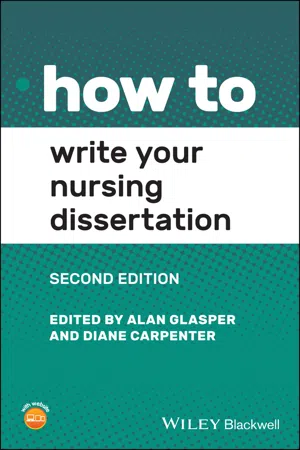
How to Write Your Nursing Dissertation
- English
- ePUB (mobile friendly)
- Available on iOS & Android
How to Write Your Nursing Dissertation
About this book
How to Write Your Nursing Dissertation provides nursing and healthcare students with authoritative information on developing, writing, and presenting an evidence-based practice healthcare dissertation, project or evidence-informed decision-making assignment. Written by experienced healthcare professionals, this comprehensive textbook offers clear and straightforward guidance on sourcing, accessing, and critically appraising evidence, helping students develop their clinical research and writing skills. The authors address the common difficulties encountered throughout the process of writing a dissertation, project or evidence-informed decision-making assignment, and offer expert tips and practical advice for managing time, developing study skills, interpreting statistics, publishing aspects of the work in a journal or at a conference, and more.
Now in its second edition, this bestselling guide presents relatable and engaging scenarios to illustrate the setting of standards, explore legal and ethical frameworks, examine auditing and benchmarking, and demonstrate how evidence is applied to real-world problems. Covering the entire dissertation, project or evidence-informed decision-making assignment process from a nursing and healthcare perspective, this innovative textbook:
How to Write Your Nursing Dissertation is a must-have guide for nursing and healthcare students, trainees, other healthcare students required to complete an evidence-based practice project, and anyone looking to strengthen their critical appraisal and assignment writing skills.
Tools to learn more effectively

Saving Books

Keyword Search

Annotating Text

Listen to it instead
Information
Section 1
Starting your dissertation journey
Chapter 1
Starting the journey of your final‐year project
What is a final‐year project?
Table of contents
- Cover
- Table of Contents
- Title Page
- Copyright Page
- List of Contributors
- Foreword
- Preface
- About the companion website
- The Scenarios
- Section 1: Starting your dissertation journey
- Section 2: Sourcing and accessing evidence for your dissertation
- Section 3: Developing your healthcare/ evidence‐based practice dissertation
- Section 4: Preparing to use research evidence in your dissertation
- Section 5: Critically appraising evidence
- Section 6: Taking your dissertation further: disseminating evidence, knowledge transfer; writing as a professional skill
- Index
- End User License Agreement
Frequently asked questions
- Essential is ideal for learners and professionals who enjoy exploring a wide range of subjects. Access the Essential Library with 800,000+ trusted titles and best-sellers across business, personal growth, and the humanities. Includes unlimited reading time and Standard Read Aloud voice.
- Complete: Perfect for advanced learners and researchers needing full, unrestricted access. Unlock 1.4M+ books across hundreds of subjects, including academic and specialized titles. The Complete Plan also includes advanced features like Premium Read Aloud and Research Assistant.
Please note we cannot support devices running on iOS 13 and Android 7 or earlier. Learn more about using the app